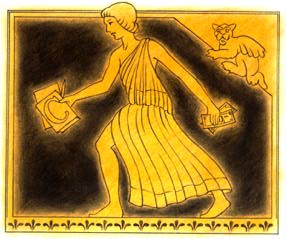
I wasn't descended from a Civil War veteran who had fought for the North at Antietam; I wasn't a young person who came from the Sioux City area. But I did need a scholarship.
I had grown up in Hyde Park, where many of the big brothers and sisters of the children I played with carried heavy briefcases, wore thick, tortoise-shell glasses, and walked to their University classes. My brother and I rode our bikes around the winding footpaths of the campus, stopping to gaze at the fierce faces of gargoyles, wondering what went on behind those mullioned windows, already dirty even that long ago.
By the time I finished high school, I knew the campus well, but I could not afford to attend the University. Many were poor in those days, of course. George Orwell's description of his own family's social position applied to mine. With characteristic precision, he ranked himself as a member of the lower-upper-middle class. As he explained it, "that means middle class without money."
The Depression was Just One More Blow to us, without surprise or shock value, for we were established as the family's "poor relatives." My father-a scholarly, loving man who happened also to be a gambler-was already functionally bankrupt.
So I went to the Chicago Teachers College, tax-supported, free, and offering the remote possibility of a job at the end of three years. Housed in a couple of grimy buildings on the South Side, it had a pitiful library, a tired faculty, a dreary course of study, and leaking toilets. If no one else took teachers' colleges seriously, they at least took themselves very seriously. Almost every course title began with the solemn phrase, "The Teaching of…." Penmanship in Grades One to Three. Social Studies in Grades Seven and Eight. Arithmetic in Grades Four to Six.
Having completed my three-year sentence at that place, I arrived at the University with enough credits to be a junior and enough money to pay for one quarter. Thereafter, overriding my pleasure in courses in Shakespeare, Mark Twain, Donne and the Metaphysicals, the Nineteenth-Century Novel, was the matter of the next quarter's tuition. Would I be able to pay it?
A hungry learner, I found everything exciting, even the lunch-time concerts: Mahler and Brahms and Mozart on records in a lecture hall on the first floor of the Social Science Building. I could usually afford a grilled and buttered schnecken with a pot of tea in the Coffee Shop, where Divinity School students as poor as I was- most of them farm boys with squeaky shoes-acted as waiters, working for their meals and willing to bring more hot water for a second cup of tea.
The quarters passed quickly, and always hanging over me was the ominous possibility that there would not be money for the next one's tuition. The day came when I was forced to approach the dean, a kindly man who really seemed to wish he was able to help me. I sat across from him as he read to me from lists of available scholarships.
To each possibility was attached a peculiar prerequisite tailoring it to the will of the donor, requirements that had nothing to do with my good grades or dire need. He told me about a group that wanted to sponsor someone of Norwegian ancestry-preferably originating from the community near Trondheim; another scholarship was tagged
or a descendant of a Civil War veteran who had fought for the North at Antietam. Here was one for a young person who came from the Sioux City area and had exhibited other valuable qualities as well.
("Kate, is this true?" someone will ask. Well, essentially, yes. If the details are contrived, the specifications were no less remote from my qualifications.)
"Listen to this," the dean continued. "This one's intended for a young woman of admirable character, excellent scholarship, and Greek ancestry. Sponsored by a social club called the Votaries of Athena, Goddess of Wisdom. Too bad you're not Greek."
"Oh, but I am Greek!" I assured him. "Yes, I know that my last name is `Mann,' but it's been shortened from `Manousopoulos' at my mother's insistence.
"I am Greek-all the way back to Agamemnon! I am descended from Spartan kings!" (At least, that's what my father had always told his children.)
I sent my letter of supplication to the Votaries of Athena, explaining that my father had come to this country from a village outside Sparta when he was a young boy. It had not previously occurred to me, but now I threw it in hopefully: a consuming desire to learn Ancient Greek.
I received their reply. While impressed with my grades and my aspirations, their president regretfully concluded that the Votaries could not help me. Working with limited funds and forced to make difficult choices, they could not, she explained, give their scholarship to someone who was not "all Greek." Circumstances beyond my control had rendered me half-a-Greek short.
So I had to leave the University for a while. I got a job teaching second grade at the nearby school of St. Thomas the Apostle. Each morning I played Sousa's "El Capitan" on a tinny piano near the open front door-and it was very cold that winter-as uniformed children marched into the school. A semester of time-out from my own education paid $65 a month, plus anything I wished to choose from the school cafeteria. I was able to save two quarters' tuition: two hundred dollars.
Katharine Mann Byrne, AB'36, AM'43, lives in Chicago. The former director of the continuing-education division at Mundelein College of Loyola University, she works as legal assistant to her daughter, Margaret Byrne, director of the Illinois Clemency Project for Battered Women, and is an essayist for the Chicago Tribune Magazine and other papers.